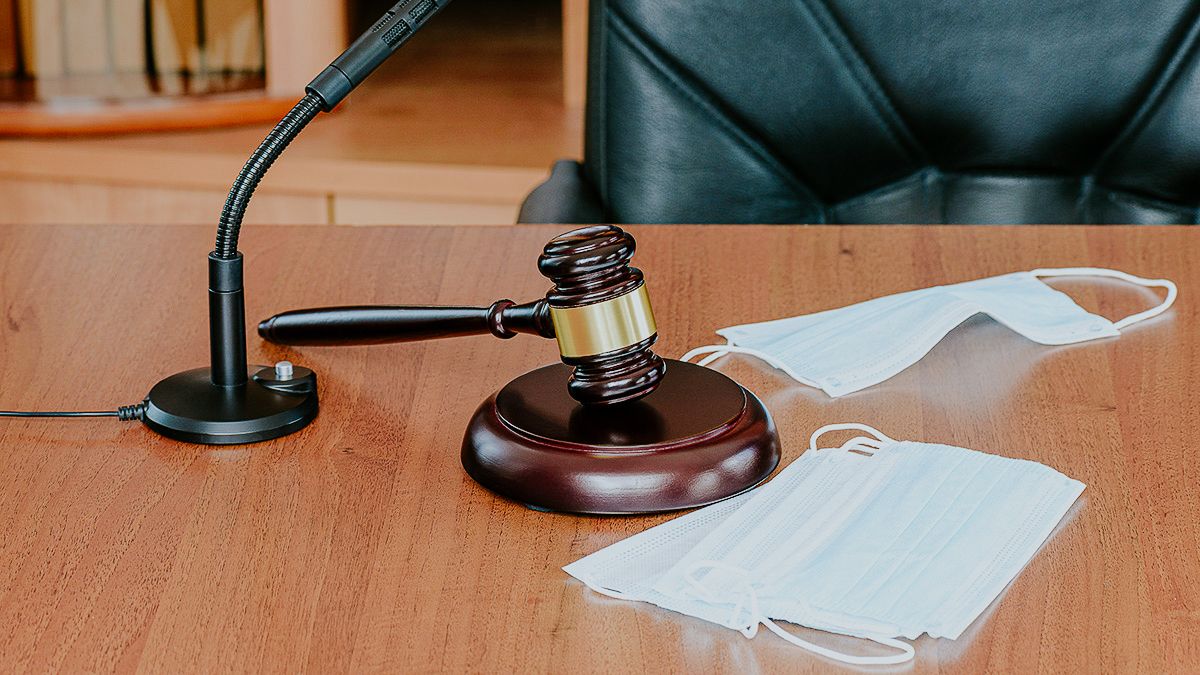February 2022 LEMR Article
This article is featured in Volume 3, Number 2 of the Legal Ethics and Malpractice Reporter.
The Covid pandemic has now gone on for more than two years. Much of the American population is tired of the various mitigation methods that have been either required or suggested, while others remain steadfastly committed to them. For example, although many people are ready to ditch their masks, plenty still prefer to wear them. Like the rest of the population, attorneys and judges fall on various points of the spectrum regarding preferences and opinions for masking, and their varying opinions have resulted in more than one conflict over the past two years. One recent disagreement between an attorney and a judge on the United States Court of Appeals for the Fifth Circuit may soon result in guidance regarding a judge’s ethical obligations when such a situation arises.
On February 3, 2022, Gabe Roth, the executive director of the organization Fix the Court, filed a complaint against Circuit Judge Jerry Smith after Judge Smith ordered a lawyer in his court to remove his mask during oral argument. When asked to remove his mask, the lawyer, Josh Koppel, demurred. Roth’s complaint reported the following exchange:
According to the audio recording, Judge Smith said to Koppel, “Remove your mask, if you would.” Koppel responded by saying: “I prefer to leave it on,” after which Smith said, “We would prefer that you remove it, thank you. […] We would prefer that you remove it.” It seems as if Koppel then did remove his mask. His initial response was plainly audible on the court’s audio recording, indicating that the mask was not impeding Judge Smith’s ability to hear him.
The complaint explained that Mr. Koppel was reluctant to remove his mask because he had just flown into New Orleans, which was experiencing a surge in Covid cases at the time, and Mr. Koppel had two young children not yet old enough to be vaccinated against Covid. The complaint intimated that Mr. Koppel feared being exposed to Covid during his court appearance not only because he might become infected, but because he might then infect his two young children. Further, according to the complaint against Judge Smith, Mr. Koppel was “adhering to CDC regarding indoor masking.” The complaint further stated that Judge Smith knew all of this because it was contained in a prior filing with the court.
Fairness requires that anyone who would draw conclusions from Judge Smith’s requirement that Mr. Koppel remove his mask know all of the facts of the incident, and we do not yet know all those facts. But the facts that we do know, unless they have not been stated fully and honestly, suggest that Judge Smith’s actions in his courtroom were unsympathetic and perhaps even unkind. Indeed, if Mr. Koppel’s statements while wearing his mask were as easy for the judges to hear as they were for the court’s recording equipment to pick up, the Judge’s reasoning is difficult to comprehend.
The question posed by the complaint, however, is not whether the Judge Smith’s insistence that Mr. Koppel remove his mask was sympathetic or kind, but whether it violated Canon 3(A)(3) of the Code of Conduct for United States Judges. That Canon states:
A judge should be patient, dignified, respectful, and courteous to litigants, jurors, witnesses, lawyers, and others with whom the judge deals in an official capacity. A judge should require similar conduct by those subject to the judge’s control, including lawyers to the extent consistent with their role in the adversary process.
The Comment to this Canon states:
Canon 3A(3). The duty to hear all proceedings fairly and with patience is not inconsistent with the duty to dispose promptly of the business of the court. Courts can be efficient and businesslike while being patient and deliberate.
The duty under Canon 2 to act in a manner that promotes public confidence in the integrity and impartiality of the judiciary applies to all the judge’s activities, including the discharge of the judge’s adjudicative and administrative responsibilities. The duty to be respectful includes the responsibility to avoid comment or behavior that could reasonably be interpreted as harassment, prejudice or bias.
The judge’s language was respectful when he asked Mr. Koppel to remove his mask. But was the act requested itself respectful and courteous? The complaint certainly suggests it was not.
Indeed, the complaint goes even further by suggesting Judge Smith violated his duty to act with “integrity and impartiality” in all the judge’s activities, including the discharge of the judge’s “adjudicative…responsibilities,” where it states:
What’s more, if Judge Smith does not take COVID seriously, even as 2,500 of his fellow Americans are dying each day on average and close to 900,000 Americans have died from it in total, it is likely he will not be unbiased should cases concerning the disease reach his courtroom.
Perhaps if the judge’s requirement that Mr. Koppel derived from some discriminatory or biased beliefs, then those actions did violate Canon 3(A)(3).
On the other hand, if the judge’s actions simply reflected his decision as to how lawyers and others in the court must behave, absent any prejudice or bias, then holding that the judge violated Canon 3(a)(3) may well be a step too far. The Canon does not require that judges be compassionate; it only requires that they “act in a manner that promotes public confidence in the integrity and impartiality of the judiciary” and “avoid comment or behavior that could reasonably be interpreted as harassment, prejudice or bias.”
Here, a broad interpretation of Canon 3(A)(3) may lead to a chilling effect on judicial behavior that may have unexpected and negative ramifications. But that does not necessarily mean judges can or should force lawyers to expose themselves and their families to risk of infection. That, too, is highly problematic.
The ultimate determination as to whether or not Judge Smith violated Canon 3(A)(3) will be of interest to every lawyer who must appear in court—many of whom may have already had an experience similar to Mr. Koppel’s.
About Joseph, Hollander & Craft LLC
Joseph, Hollander & Craft is a premier law firm representing criminal, civil and family law clients throughout Kansas and Missouri. When your business, your freedom, your property, or your career is at stake, you want the attorney standing beside you to be skilled, prepared, and relentless. From our offices in Kansas City, Lawrence, Overland Park, Topeka and Wichita, our team of 20+ attorneys has you covered. We defend against life-changing criminal prosecutions. We protect children and property in divorce cases. We pursue relief for victims of trucking collisions and those who have suffered traumatic brain injuries due to the negligence of others. We fight allegations of professional misconduct against doctors, nurses, judges, attorneys, accountants, real estate agents and others. And we represent healthcare professionals and hospitals in civil litigation.













